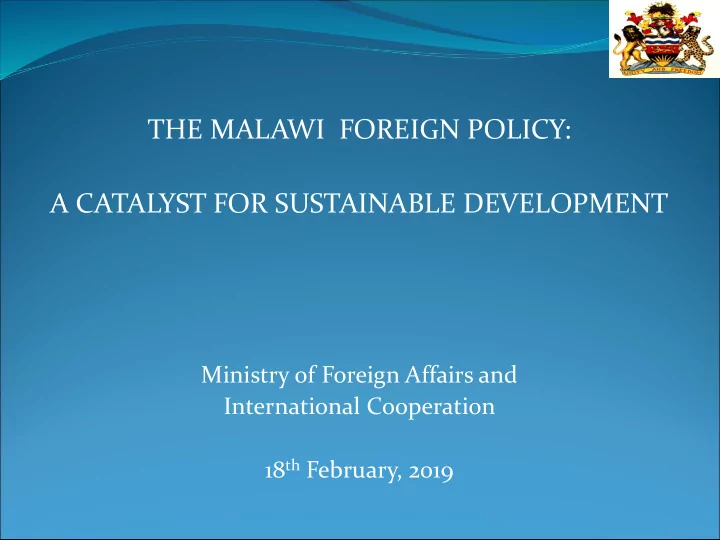

THE MALAWI FOREIGN POLICY: A CATALYST FOR SUSTAINABLE DEVELOPMENT Ministry of Foreign Affairs and International Cooperation 18 th February, 2019
OUTLINE ❑ Introduction ❑ Justification ❑ Definition ❑ Policy Goal ❑ Priority Areas ❑ Implementation Arrangements ❑ Monitoring and Evaluation ❑ Conclusion
INTRODUCTION Up until the year 2000, the Government of Malawi had been operating based on unwritten Foreign Policy on its interactions with the international community since independence in 1964. During this period, (1964 to 1993) Foreign Policy was by Presidential decrees and directives .
INTRODUCTION The first written Malawi Foreign Policy was launched in 2000 and was subject to five yearly periodical reviews. The 2 nd Edition of Malawi Foreign Policy was, therefore, overdue – No reviews were done up until to 2017. The Foreign Policy which will shortly be launched is based on - conclusions of a synthesis report - comprehensive analysis of official development assistance (ODA), trade flows, foreign direct investment (FDI) flows, tourist flows and diaspora remittances into the country since 1964.
CONSULTATIONS The MoFAIC - consultations with the Ministries, Departments and Agencies (MDAs); Legislature; Academia, Private Sector, Civil Society Organisations (CSOs) and Non-Governmental Organisations (NGOs) in the formulation of the policy. More so considering that – the Policy sets out goals, objectives and means on how the nation can interact with the international community for the realisation of the domestic development agenda.
ANCHORED ON MGDS III The Government is focused on translating the MGDS III into tangible outcomes and benefits to the people of Malawi. This policy aims at utilizing the MGDS III as a tool to mobilize inter alia: financial resources, technical assistance and transfer of technology in order to attain its goals and objectives.
SUSTAINABLE DEVELOPMENT Sustainable development is premised on peace and tranquility, hence Policy’s emphasis on peace and security, promotion of human rights and democratic governance. Global Dynamics This Policy review has, therefore, considered global dynamics, emerging issues, the vast challenges and opportunities in the 21 st Century these include: climate change, migration, digital and ICT revolution, unprecedented FDI flows, terrorism and transnational organized crimes.
JUSTIFICATION This policy now empowers the Ministry of Foreign Affairs and International Cooperation to carry out its mandate with clearly set objectives, goals and expected outcomes. The Ministry and all the relevant stakeholders will also have a direction on taking the country forward in its development agenda. This policy provides a reference on how it complements other Government policies and in that regard emphasizes the need for collaboration and coordination by all relevant MDAs and stakeholders.
DEFINITION A country’s foreign policy consists of self-interest strategies identified by the state in order to safeguard its national interest and to achieve specific goals during its engagement on the international arena. The Foreign Policy of the Republic of Malawi is, therefore, a blueprint that serves to guide how the country conducts her foreign relations, while safeguarding her own national economic, political, social and cultural interests.
Aim of the Foreign Policy The overall aim is to: inform, guide, and strengthen the conduct of Malawi foreign relations with the international community. Protecting national interest, facilitating the creation of favorable conditions for sustainable economic development, and improving the well- being of all Malawians.
POLICY GOAL The overall goal of this policy is to: - to advance Malawi’s strategic economic, political, social and cultural interests at the international level.
POLICY PRIORITY AREAS The Foreign Policy’s five (5) core thematic areas are as follows: Sovereignty and Territorial Integrity; Sustainable Development; Peace and Security; Democratic Governance and Human Rights; and Environmental Management and Climate Change.
IMPLEMENTATION ARRANGEMENTS The implementation of the revised Foreign Policy will involve participation of several stakeholders, including: Ministries, Departments and Agencies (MDAs), National Assembly, Private Sector, Development Partners, Civil Society Organizations (CSOs) and Non- Governmental Organizations (NGOs), ALL MALAWI CITIZENS.
IMPLEMENTING INSTITUTIONS Sovereignty and Territorial Integrity: Ministry of Defence, Ministry of Homeland Security, Ministry of Justice and Constitutional Affairs, Malawi Defence Forces (MDF), and National Intelligence Bureau (NIB); Sustainable Development: Ministry of Industry, Trade and Tourism; Ministry of Finance, Economic Planning and Development; Malawi Investment and Trade Centre (MITC); Ministry of Information and Communication Technologies; Malawi Communication and Regulatory Authority (MACRA); Malawi Confederation of Chamber of Commerce and Industry (MCCCI) and Malawi Bureau of Standards (MBS).
IMPLEMENTING INSTITUTIONS Peace and Security: Ministry of Defence, Ministry of Homeland Security, Ministry of Justice and Constitutional Affairs, Malawi Defence Forces (MDF) and National Intelligence Bureau (NIB); and Democratic Governance and Human Rights: Ministry of Justice and Constitutional Affairs, Malawi Law Commission, Office of the Ombudsman; Malawi Electoral Commission (MEC), Malawi Human Rights Commission (MHRC) and Council for Non- Governmental Organisation of Malawi (CONGOMA).
IMPLEMENTING INSTITUTIONS ▪ Environmental Management and Climate Change: Ministry of Natural Resources, Energy and Mining, including Department of Climate Change, Department of Meteorology and Department of Forestry. Cross Cutting Stakeholders: The Malawi National Assembly, all Malawi citizens at home and abroad - Diaspora, business community, etc
MONITORING AND EVALUATION “If we cannot measure it, we cannot do it” The implementation of the Policy requires an effective and efficient Monitoring and Evaluation (M&E) system. The system shall provide feedback information needed to identify implementation challenges and gaps. Monitoring and Evaluation (M&E) Plan of this Policy with appropriate performance indicators, outputs and targets.
CONCLUSION The Ministry of Foreign Affairs and International Cooperation will successfully implement the Policy through effective collaboration and coordination with all the relevant stakeholders. There will also be need to be vigilant and alert on any emerging developments on the international scene and respond accordingly through a policy review or other appropriate ways and means.
NEXT STEPS ACTION, ACTION, AND MORE ACTION! I THANK YOU For Your Attention
Recommend
More recommend